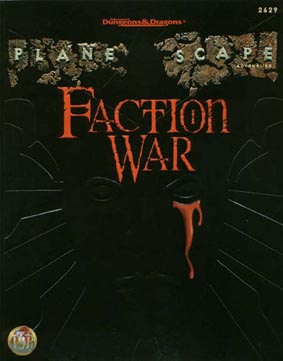In my A Game Per Year project, my goal has been to read one roleplaying game corebook for every year they’ve been published. However, I soon started to feel that it was hard to decipher how the games were really meant to be played. For this reason, I decided to start a parallel project, An Adventure Per Year, to read one roleplaying adventure for each year they’ve been published.

I remember when the Planescape campaign setting game out for AD&D 2nd Edition in the Nineties. I fell in love with it immediately. The visual style, the attitude, the big concepts, all of it appealed to me greatly. In the coming years, I made many attempts to run a game in Planescape, always with mixed results.
At first, I tried to run a straightforward AD&D game in the setting of Planescape. It kind of worked but there was a discrepancy between the grandeur of the setting and the tedium of dungeon battles. As I tried to hack it to make the experience coherent, I ended up creating various games that focused on a single setting element or discarded the framework of AD&D entirely.
It’s been over twenty years since I last read a Planescape book so it was fun to go through the adventure Faction War. The slang, the visuals… It’s all there and it has held up pretty well.
Planescape features a vast cosmology of planes of existence, a fashionable framework for setting design in the Nineties also seen in games like Everway. The Nineties were they heyday of setting design in roleplaying games and the multiplanar construct is the pinnacle of that trend: What if you could have an infinity of settings instead of just one? What if they were all connected?
In Planescape, the locus of the setting and a key point of connection between the various planes is Sigil, the City of Doors. This is where player characters often hang out and where Faction War is set.
The Factions are a key setting element in Planescape. The setting aspires to lofty conceptual highs by foregrounding the philosophical differences of the various denizens of the planes. Each player character belongs to a Faction, a philosophical and ideological organization.
Coming back to this now, years later, I’m struck by how interesting the Factions are. They’re defined by their ideas and ideological conflict is at the core of their politics and plans. Player characters are assumed to belong to different Factions, giving the group ideological diversity.
Obviously they’re also identity-creating clubs like the Clans of Vampire: the Masquerade but the presence of actual philosophical concepts gives them depth. Examples are the Society of Sensation who believe that the goal of an individual should be to accumulate as many striking experiences as possible and the Bleak Cabal who hold existence to be meaningless, giving themselves over to charity work and helping the poor and mentally ill.
Like the setting it belongs to, Faction War struggles to reconcile its big ideas with the demands of an AD&D game. The Factions go to war alongside predictable law/chaos lines and the player characters are drawn into individual skirmishes and sidetracks. It’s possible they have a personal connection to one side or the other because of their Faction memberships but the adventure largely assumes them to be mercenary adventurers. There’s a backstory involving a Faction leader who wants to strike down Sigil’s inscrutable mistress, the Lady of Pain, but it’ll probably remain unknowable to the players.
Persistent fictional universes as seen in roleplaying games have a structural problem that keeps repeating across different franchises. When the setting is designed, it’s coherent and cool. To fulfill the needs of a publishing schedule, stories develop in the setting. Eventually, they need higher stakes so events inside the setting change it irrevocably. (Often signaled by marketing copy such as “Nothing will be the same!”)
After a few rounds of these tumults, the setting easily becomes a garbled mess. Yet it would also be boring if everything remained the same. It’s hard to navigate this problem well, especially as creative teams change.
In Faction War, the big change is that the Factions fall, replaced by nothing much. It makes reading the book a bittersweet experience: I rediscover all this cool stuff, only to see it swept aside.